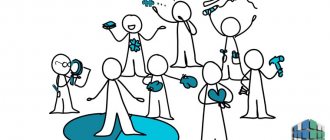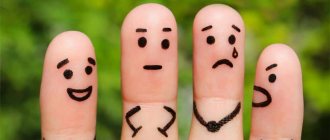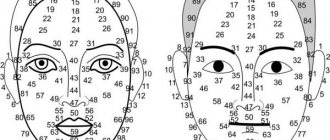Hello, dear readers of the KtoNaNovenkogo.ru blog. “This is character!” - we are talking about a person who is tough in his judgments, purposeful in life and unbending under the blows of fate.
As a rule, this remark is pronounced with a degree of envy and admiration. While “spineless” people do not evoke respect from others.
How does the first type of people differ from the second? And is it true that a person can lack character?
What is character
In fact, everyone has character. Translated from ancient Greek, this term literally means “sign”, “ feature ”, “ distinctive mark ”.
If we expand the definition, it turns out that character is a set of stable personality traits, properties of the psyche that determine a person’s behavior, reactions and other manifestations.
For example, in the same situation, people behave differently: a lonely, small kitten will evoke pity in someone and a desire to feed and warm it. Others will remain indifferent to the defenseless creature.
In the first case, a person is endowed with kindness, kindness, and the ability to sympathize with the misfortune of others - these are his distinctive features. In the second case they are absent.
Each person is endowed with his own unique set of characteristic features, so there are no two individuals who are absolutely identical in character. Even individuals who are very similar at first glance will still find differences among themselves.
Kretschmer's theory
This German scientist divided the personality and character of a person into three main groups in psychology. To each of them he classified people with different physiological characteristics:
- Asthenics. Such people have a thin physique, thin legs and arms, and rather weak muscles. In Kretschmerian psychology, such an individual corresponds to the personality and character of a person of the schizothymic type. These are people who are characterized by stubbornness and poor adaptation to a changing environment, as well as isolation.
- Athletics. These people have a fairly strong muscular body and an ixothymic type of character. Such an individual stands out for his calmness, practicality, authority, and restraint.
- Picnics. The figures of such people are quite dense and in most cases are overweight. Picnicians can be distinguished by their large head, short neck and small facial features. Their character is characterized by sociability, quick adaptation to changing conditions and emotionality.
Human Character Traits
Character traits are a huge list of personal qualities, including kindness, cruelty, compliance, stubbornness, responsibility and irresponsibility, suspiciousness, courage and many others.
They can be either desirable or positive, or negative - which people often want to get rid of (become bolder, more confident).
The entire set of traits is usually divided into 4 large groups , each of which combines certain mental properties:
- Relationships with other people - openness or closedness, kindness or cruelty, arrogance or respect, and others.
- A person’s relationship with himself – self-criticism or arrogance, vanity or modesty, etc.).
- Attitude to work activity – neatness, carelessness, activity – laziness, responsibility – “careless” approach, etc.).
- The attitude towards material things is care or negligence.
All these traits are found in different proportions in different people, thus forming different types of character, which will be described below.
How are strengths different from weaknesses?
Wit
All weaknesses can become strengths if you look at them from a different angle. For example, a person is restless. If he works as a sales manager or sales representative, then this is rather a plus rather than a minus.
Another example is non-conflict. Getting along is considered a positive character trait. On the other hand, there are people who simply need to be put in their place, and this sometimes requires going into conflict.
Regardless of gender and activity, there is one universal character trait that is strong in any case. Unfortunately, it is not inherent to everyone. This is a sense of humor. A witty person can always get out of a difficult situation. Such people are usually respected and people try to be friends with them.
Important! Wit often borders on sarcasm, sometimes on cynicism. Care must be taken because it is a very fine line.
Character type
Scientists have not yet come to a consensus about what types of character there are. Various figures have developed their own classifications, the most popular of which are the following:
- E. Kretschmer connected the character and physique of a person . Thus, he got 3 types:
- asthenics or schizothymics are thin people with long arms and legs. Their main features are isolation, low adaptability and seriousness. There is a predisposition to schizophrenia;
- picnics or cyclothymics are short, prone to being overweight, with short limbs and a large head. Sociable and emotional people with developed sensitivity, easily adapt to circumstances. Prone to manic-depressive syndrome.
athletics or ixothimics - have tall stature, good body proportions and developed muscles. They are characterized by authority, desire for leadership, calmness and restraint. Negative character traits include the inability to adapt and show emotions. Prone to epilepsy;
- hyperthymic type – lively, energetic, sociable;
dysthymic - a slow, pessimistic person, withdrawn;
- extrovert - striving outward - sociable, energetic, lives in the world around him;
introvert - seeking inward - closed, lives in his inner world, the external world is not interesting to him.
- the oral type is characterized by dependence on other people’s opinions, immaturity, fear of rejection and the need for support from others;
masochistic – sensual, insightful, loves to suffer;
Capabilities
Important personality traits are considered to be abilities that determine the individual style of activity and are the basis for its success. There are also qualities that provide the ability to interact with other people and are necessary to gain respect and authority from others.
Abilities and inclinations
Abilities are a complex system of human qualities and properties. Their biological basis is inclinations, that is, innate physical and mental characteristics, including temperamental properties. But not only. Often, inclinations are associated with the psychophysiological characteristics of the body; they are given to a person from birth and are necessary for success in a particular activity. But they don't guarantee it.
For example, an ear for music is required by a musician, and a high sensitivity of the visual analyzer is required by an artist. But this alone is not enough to master an activity, much less to achieve success. To do this, you need to develop abilities, and this is only possible through activity and requires the investment of labor and willpower. Mastery is not a gift given by nature or God, but, above all, work and perseverance.
Is it possible to develop abilities in the absence of natural inclinations? This is a very difficult question; there is no clear answer to it. Undoubtedly, in the absence of the necessary qualities, it will be more difficult to master the activity, it will require more effort and, perhaps, the achievements will not be so impressive. But recently, more and more psychologists support the idea that a persistent and persistent person can learn anything. The main thing is to give him the right training techniques. That is, to teach any person to draw, you just need to know how to teach correctly.
Types of abilities
The whole variety of human abilities is usually divided into two types: general and special.
Special qualities include those qualities that are required to master a specific activity, such as, for example, an ear for music for playing musical instruments or a phonetic ear for learning foreign languages. Playing sports requires endurance and mobility, and working with children requires a sense of empathy.
General abilities are no less diverse, because they are needed in a wide variety of areas of activity. First of all, these include mental abilities or level of intelligence. Although intelligence is considered an innate characteristic of a person, mental abilities require their development, including the quality of memory, attention, thinking, as well as the volitional sphere and reflection.
Sometimes a high level of mental ability combined with learning ability is called giftedness. This quality of a person can compensate for his lack of some special abilities and allow him to achieve success in many types of activities.
No matter how valuable abilities are, they are only potential, an opportunity for further development and improvement of a person. The same can be said about other individual psychological characteristics. Each individual has the opportunity to become a unique, extraordinary, talented person, but for this you need to know your psychological characteristics, your strengths and weaknesses and actively engage in self-development.
Formation of human character
Character begins to form from the first days after birth. By the age of 4-5, the general structure of the personality is already visible, and by the age of 10, the character is already fully “complete.”
What factors will influence character traits:
- genetic predisposition - there is an opinion that some traits are inherited from our parents;
- society - parents and other significant adults (relatives, neighbors, teachers), friends, classmates;
- life circumstances are situations that a child faces. For example, the financial situation of the family, events of various modalities also influence the future character. If the same child experiences the death of a loved one or, conversely, something bright and positive, these two factors will leave different imprints on his personality.
Initially, the baby looks at how his parents treat him. Further, it is with this attitude that he will go into the big world. That is, if he was loved , surrounded with warmth and care, talked about his value, then this is exactly how he will feel among others - significant, important, valuable. This is how he will treat people. And vice versa.
Bottom line
Personality character often helps in understanding the personality itself, since everything revolves around its inner world, which has manifestations in the form of reactions, emotions, behavior, actions and even achievements that are currently available. Considering the different character types can lead to the following result - understanding people quickly and easily.
Character is a flexible characteristic that can be changed at any time. It can change both unconsciously and under the influence of the willpower of a person who controls the manifestation of a particular quality. The longer a person exhibits a particular quality, the more it is consolidated and becomes one of his characteristics that influences the future development of life.
What are the types of temperament?
We figured out what character is. These are personal characteristics of a person that are formed from birth. It is often confused with temperament , although these concepts are far from the same thing.
Temperament is a property of the nervous system: its mobility, responsiveness, stability. This quality of an individual is innate and, unlike character, cannot be changed.
Temperament can be thought of as the basis on which character will subsequently be formed, with the former significantly influencing the latter. Hippocrates wrote about the types of temperament; psychology adheres to his classification to this day:
- melancholic – an anxious person who does not cope well with stress due to a mobile nervous system;
- sanguine – balanced, logical, lively, sociable, optimistic;
- choleric – explosive, impulsive, hot-tempered;
- phlegmatic (who is this?) – a stable, hardy personality type, calm and measured.
Video
Coffee capsule Nescafe Dolce Gusto Cappuccino, 3 packs of 16 capsules
1305 ₽ More details
Coffee capsules Nescafe Dolce Gusto Cappuccino, 8 servings (16 capsules)
435 ₽ More details
The best telescopes











